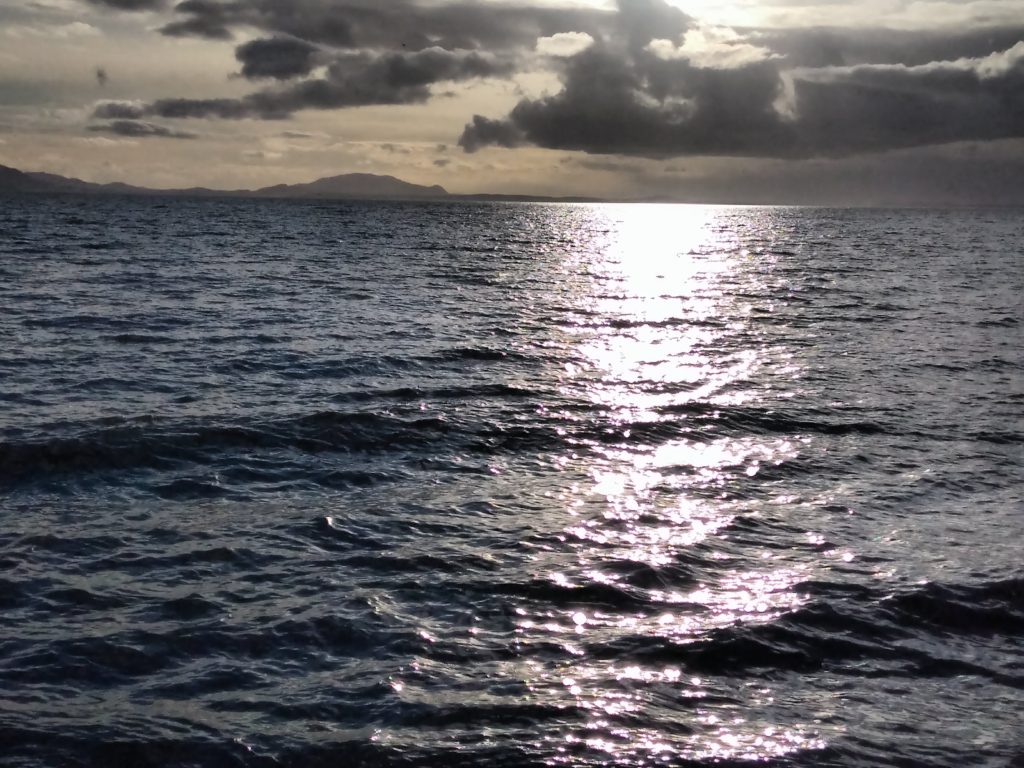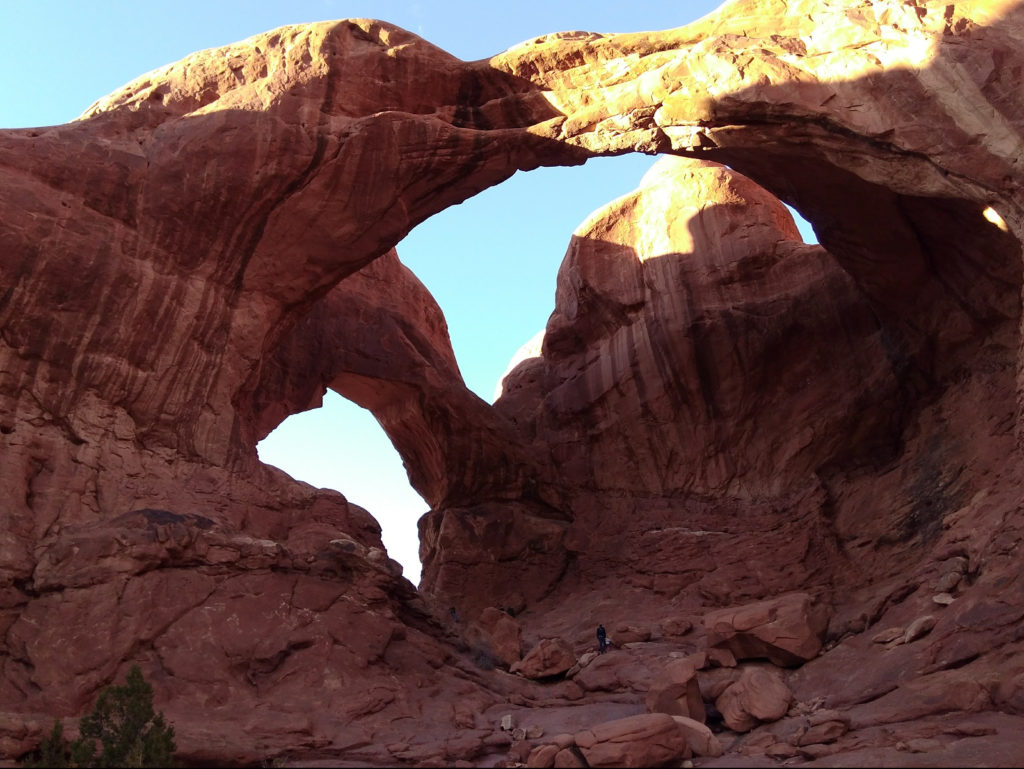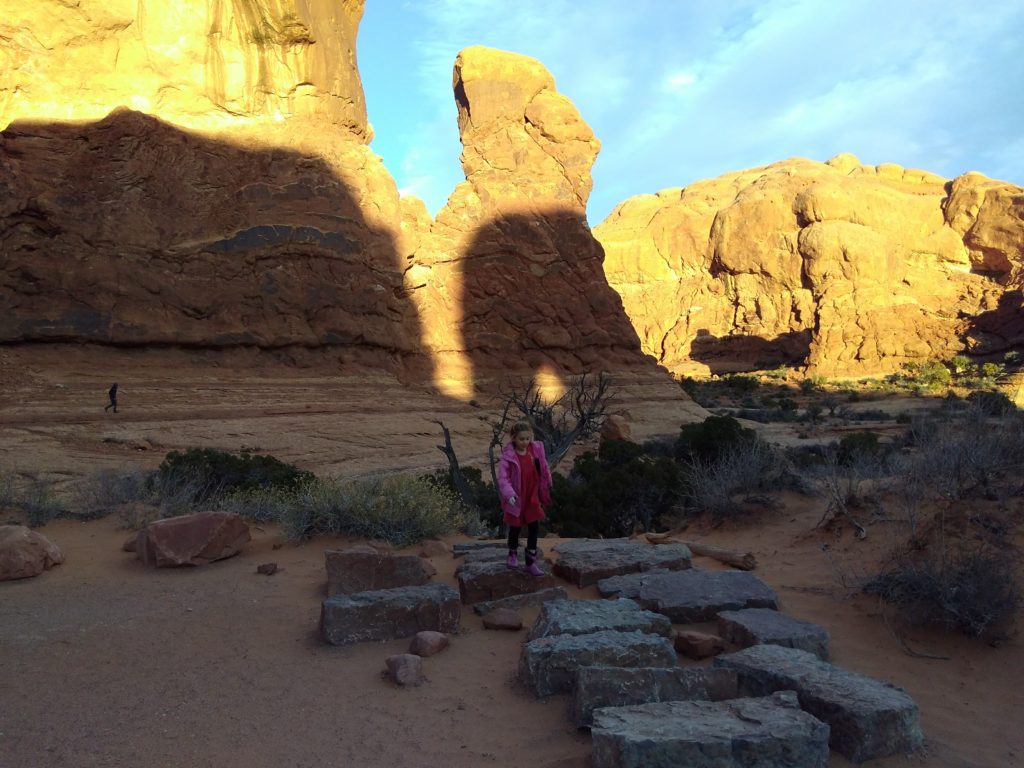
We moved up the road a bit to be out of the crowd of people trying to find a ride over the border into Italy. The weather I remember was that perfect temperature of the Mediterranean at the height of summer, the light the perfect light of the coast, bright yet full of contrast. We were content to just lean against a guardrail and wait. I was the one to stick out my thumb at the roadside, a young blond woman in shorts.
It may have been hours. It may have been minutes. A medium sized truck stopped and motioned for us to climb in. We gathered our things quickly and jumped into the back which was all packed with sacks. As we started through the border, I could see the Italian Carabinieri standing in groups on the other side with their high brimmed hats, dark blue uniforms and white bandoliers across their chests. They looked distinctly threatening, like holdovers from Fascist times. I braced for barks of authority as we reached the customs booth. But all went well. We jumped down off the end of the truck and presented our passports. They were duly stamped by officials who smiled and said “American, ha!” as they looked from my face to the passport. We climbed back in, Michel waving to a group of Carabinieri as we passed. They smiled. He said, “They actually look friendly!” “We’ll see.” I said.
The next two or three days are a blur in my mind’s eye. We must have taken the faster autoroute, the A-10 up away from the coast, bypassing around mountain towns. I remember only miles and miles of hills full of dark trees, small fields up against grape vineyards, and small towns with red-tiled-roofed houses in what must have been Liguria. And then into the region of olive groves, through to Bologna. Somewhere along the way that first day we got a ride with a truck carrying local table grapes to market. The drivers let us sit in back with the roll-up door open and motioned with hand gestures for us to eat all we wanted. We sat with our backs braced on crates of grapes, comfortably watching the scenery unwind behind us, eating grapes and throwing stems out the open back. I remember the fragrance of the grapes and washing our sticky hands with water from a big plastic bottle but nothing more.
We must have gotten stuck in Bologna for awhile, waiting for a ride on the outskirts of town. We never went into any of the cities we passed. There was no time. We had to make our rendezvous for the ferry in Bari in two more days. We ate what we had in our packs and snacks bought at wherever our rides happened to stop. There were long periods of waiting by the road. It is all a blur except for one night spent in a grape vineyard.
It must have been late evening when we stopped travelling, dropped off by the last ride of the day. We looked around in our darkening surroundings and saw we were on the edge of a large vineyard. The soil under the vines was smooth and inviting. The ground felt cool after the heat of the day. Tired out, we walked back into the rows out of sight of the road and spread our woollen bags under the vines.
The soil was soft and fluffy, a perfect place to stretch out in relative comfort. We had no consciousness of the probable toxic herbicides and fungicides we were breathing in the dust. Lulled to sleep by the surrounding silence and the new fragrance of ripening grapes, we slept soundly until morning light.
There is nothing else I remember of our journey across Italy, although there must have been some difficulties. Maybe it was just problems getting rides that stretched out the time, but we were late for our rendezvous in Bari. The day must have arrived when we were still at some distance down the A14. We must have been worried. Our friends might have bought tickets already for the ferry, counting on us to arrive as planned. If we were late, would they leave? I’m sure we doubted that, yet there would always have been some tiny element of uncertainty. Our mode of transportation meant we had no control over the speed of travel. I faintly remember some irritability between us as we stood by the side of the road for hours with cars passing us.
When we finally arrived in Bari, we were twelve hours late. My memory is filled only with the large concrete buildings around the ferry dock, large boats in the harbor. It was morning when we finally got out of our final ride, the morning after the departure of the ferry we’d planned to take. We found our friends rather quickly in the waiting area for the ferry. As soon as we spotted them, we ran across the hall calling to them and hugging as we met. There were apologies and stories of the days we’d spent apart. They were clearly also road-weary eyes, anxious glances, hair a bit uncombed. It must have seemed to all of us, standing there together, that we were looking into some strange mirror. When they had finally realized we were not arriving for the ferry the night before, they knew they must spend the night in Bari, but by that time there were no hotel rooms available. They had managed to stay in the small apartment of an odd man from Romania they’d met at the ferry terminal. They’d had been glad to make it safely through the night and out early in the morning. As part of the tumbling stories, they told us that the next ferry for Greece wouldn’t leave for another few days. We would have to travel down the coast to Brindisi where a ferry left the next day for our destination, Patras, on the other side of the Adriatic Sea.
Michel, now torn with the prospect of going to Greece, decided he did, in fact, need to get back to Strasbourg and see his family for the rest of the summer. He had promised. He left us that day on a bus, hoping to see us once more in Paris at the end of our trip. It was never to be. That was the last we ever saw of him, waving goodbye from the window of the bus, standing in the aisle, tanned but with tired eyes, crouched over a woman in the seat.
Now it was just the three of us, standing there suddenly feeling a bit shy of each other, strangest for me to be alone with my friend and this man I had know for only a day or two. I remember the run into the ferry terminal from our last ride, bags flapping around our shoulders, the wait on the line of people boarding with bags of grapes, bottles of wine and suitcases, duffles and backpacks—families with several children, couples old and young, young Greek men returning home from some job abroad, jovial and rowdy, a few young Greek women with a grandmotherly looking figure with a shawl, a group of tourists, shepherded by a young woman speaking English—a whole crowd all flowing up onto the three deck ferry, heading out across the wine dark sea.
The wine-dark sea. The peace that passeth understanding. The passage to the land of myth, the land of heroes would be a long one. We wandered with the crowd looking for a place to sit and spread out our gear. There was a quick consensus that the top deck was the best place to be. From there we would see the sea and the islands as we steamed along and feel the fresh air in the possibly bumpy waters of the Ionian. We found a bench next to a big metal box full of life jackets and settled down as the huge ferry pulled away from the dock. From where we sat, we watched as the multicolored two and three-story stucco buildings moved by us, gleaming from the shore and we passed through the wakes of the tall-sailed blue, red and green yachts in the harbor out into the more open turquoise water.




